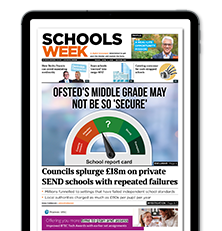Schools’ focus on making food parcels and visiting disadvantaged pupils in the first lockdown may have affected their “capacity” to provide remote education, Amanda Spielman has said.
The Ofsted chief inspector appeared at an event held by the Institute for Government (IfG) think tank this morning, where she was quizzed on how schools would tackle the issue of catch-up following school closures last year.
Here’s what we learned.
1. Food parcels were put above remote learning
Spielman told the event today that in the first lockdown, some schools focused on helping the poorest pupils, potentially affecting their ability to provide education for all children.
The chief inspector had been asked about the unevenness in resources between private schools and state schools, and the impact that had during the pandemic.
She said she had seen that “in a lot of schools it felt as though their attention went very rapidly to the most disadvantaged children, into sort of making food parcels, going out visiting”.
“They put a great deal of attention into the children with the greatest difficulties, which is admirable, but in some cases that probably got prioritised over making sure that there was, certainly over summer 2020, which may have meant they didn’t have the capacity left to make sure there was some kind of education offer for all children.”
She added that during the first weeks of the pandemic “when it looked as though it might just be sort of three or four weeks, it was less obvious to some that they really did need to start assembling a full remote education offering”.
However, the chief inspector acknowledged there was “an unevenness in resource” between the private and state sector – with private schools on average having three times as much money available.
“So I don’t think we should lose sight of that entirely. But that doesn’t explain the disparities that we saw in the state sector.”
2. ‘Nice to have’ things could be cut out for worst-hit pupils
The chief inspector also warned that some “nice to have things” may have to be cut from the curriculum to ensure pupils are catching up.
She said most catch-up would take place in pupils’ “main classrooms with their normal teachers”.
Spielman referred to a “sort of everyday magic that teachers do of really motivating children to want to learn and introducing them to the whole curriculum, taking them through in a well structured way with the minimal wastage of time”.
But she warned schools would need to “be really pretty focussed”.
“There are experiences, ‘nice to have’ things that are often built into curricular, and I suspect a lot of those will get cut out for the children who have missed the most.”
The comments follow guidance, published by the watchdog last week, which warned that “time is not infinite and so, alongside identifying what content from missed topics should be prioritised, careful consideration must also be given to choices of teaching activity”.
“Do the pupils who spend a lesson on the Egyptians wrapping their friend in toilet roll remember the details of Egyptian religious beliefs, or do they just remember the fun activity,” the guidance said.
Spielman added that teaching would need to begin “where children are actually at” rather than “what did the school try to teach through the remote offering”.
3. Legal framework didn’t contemplate repeat illegal school offences
Spielman renewed calls to extend the powers Ofsted inspectors have when visiting suspected illegal schools, and a refreshing of the legal framework to deal with the issue.

She said it was “very frustrating” inspectors could not take away evidence, which would help strengthen prosecution.
The headteacher of Ambassadors High School in Streatham recently became the first leader to be prosecuted twice for running an illegal school.
Ali, and her father Arshad Ali, were initially found guilty of running a full-time school “without the legal authority to do so” in 2019.
However, Nadia Ali is accused of continuing to run the school between September 2019 and March 2020.
Sentencing will take place next week and, according to the Daily Mail, Ali has been warned she could face jail time.
Spielman said the legal framework “never contemplated really that people would carry on running an illegal school after it had been pointed out to them that they were running an illegal school”.
“We’re not looking to become a prosecutor but we would like the legal framework to be refreshed to deal with the situation as it now is, where unfortunately there are a small proportion of people who will absolutely deliberately carry on running.”
4. Think of inspections as a ‘root canal’ treatment
Spielman also spoke about the full return of the cycle of normal, graded inspections – which began this week.
While acknowledging the return was sometimes discussed with anxiety, she advised: “I sometimes think the best analogy for an inspection is a root canal treatment at your dentist. You don’t look forward to it with joy, but once it’s done you’re actually pretty glad it’s been done.”
Ofsted’s former national director of education Sean Harford, previously told Schools Week that increasing the length of inspections would reduce anxiety and “probably reduce the workload” as more time would be available to discuss evidence on site.
5. MPs demand answers over off-rolling reports omissions
Ofsted has been asked to write to MPs to explain why off-rolling was not explicitly referenced in reports which found the practice, amid accusations the watchdog “chickened out” of highlighting the issue.
Last week, Ofsted wrote to inspectors to ask them to use the phrase off-rolling in reports for any inspection where it was found, after admitting this had not always happened in the past.
Dame Christine Ryan, the watchdog’s chair, was quizzed about the omissions during a meeting of the Parliamentary education committee this morning, and was asked to write to MPs on the matter.
Committee chair Robert Halfon asked Ryan why the practice had not been “referred-to consistently” in reports.
Ofsted said last week that the phrase’s absence from some documents had prompted some schools to issue press releases “stating that off-rolling was not found because Ofsted did not use those words”.
“My understanding is that it is going to be called out in inspection reports,” Ryan said.
“The latest information I have had from the executive is that one of the adjustments that’s been made to the guidance for inspectors is that they should all refer to any off-rolling instances in a consistent way.”
But Halfon said chief inspector Amanda Spielman had “made huge play, rightly in my view, about off-rolling, and when it comes down to it has chickened out of actually calling it what it is”.
“It should be a Ronseal issue. Off-rolling does what it says on the tin. It’s off-rolling.”
“I’d be grateful if you or the chief inspector could write to the committee about it, and explain why off-rolling isn’t being called out, given that she’s made such a big thing about it.”















Another sign that Amanda Spielman is desperately unfit for her position, no one knew how long the first lockdown was going to last, the government kept suggesting it was short term and so naturally our schools rushed to protect our most vulnerable children.